Many people’s dreams come true when they adopt a dog. Until your next payday, it may seem like that’s all you can do.
Puppies require significant time and financial investment, but you can still become a pet parent. To make the expenditures of caring for your pet manageable, you need only pay attention to the basics.
In other words, preventive medicine should take precedence.
Vaccines are an excellent solution to this problem. The best way to protect your dog’s health and save money on vet bills is to vaccinate them. The initial cash outlay makes you uncomfortable, but bear with me here; you won’t regret it.
Vaccines at a reputable vet’s office cost you between $25 and $75, but you can save money by purchasing a series of shots. You might balk at spending such a large sum at the onset, but trust me: it will pay off.
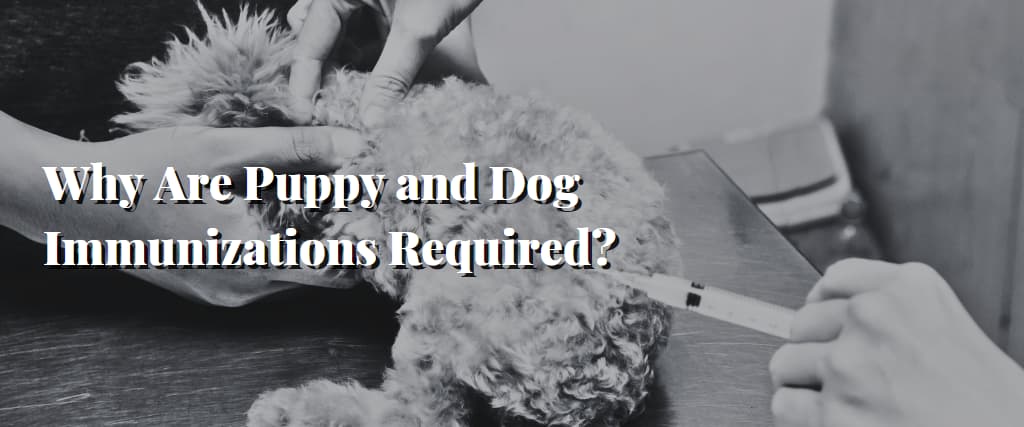
Why Are Puppy and Dog Immunizations Required?
Vaccinations protect your animal companion from potentially fatal infections. Depending on where you live, you can get your puppy vaccinated against certain diseases. However, at approximately 6 to 8 weeks, puppies receive a standard round of vaccines.
Distemper, Parvovirus, and hepatitis are some of the most dangerous viruses for puppies. They receive a series of immunisations in the first three months of life to protect them from certain diseases. In addition, the law requires you to conduct rabies immunisation for all dogs.
How Much Do Dog Vaccinations Cost?
Your puppy should begin the immunisation schedule your vet has recommended sometime between 6 and 8 weeks of age. However, several vaccines require additional doses before the age of 16 weeks. Therefore this is only the case for some of them.
There are three essential immunisations that we suggest getting for your puppy:
- Parvovirus, disemper, Canine adenovirus types 1 and 2, and parainfluenza are some diseases countered by the DA2PP or DHPP series, colloquially called the “5-in-1 vaccine.”
- Leptospirosis is a bacterial ailment spread through contact with water or soil. Leptospirosis is a zoonotic illness, so it is essential to have access to this vaccine. Consider this a basic vaccine and have it annually. Leptospirosis can lead to long-term renal and liver damage.
- Rabies is the deadliest infectious disease on the planet, yet it’s just one of many zoonotic diseases. In the absence of protection, rabies is invariably lethal.
A travelling hunting dog is susceptible to various dog ailments, parasitic diseases, and other disorders. Frequent and thorough immunisation plus parasite precautions would be crucial for this pet.
Depending on how you plan to raise your puppy, your vet may suggest additional vaccinations. Instances like these can include:
- The highly contagious respiratory virus known as kennel cough, or Bordetella, can progress to pneumonia if not treated. It is common practice to provide the vaccination in a series of shots or to give it all at once and then give annual boosters. More friendly dogs, such as those needing more of the dog park, often benefit more.
- Dogs participating in dog shows, dog sports, dog daycare, or boarding facilities should get vaccinated against H3N2 and H8 influenza, sometimes known as the “dog flu.” While the dog influenza vaccine may not provide total protection, like the human influenza vaccine, it should alleviate the disease’s symptoms and stop pneumonia from setting in.
Although the Lyme vaccine isn’t strictly a core vaccine, certain dogs may need it as a precaution. Your vet may recommend this for high-risk tick endemic areas for dogs who go hiking or hunting, work on farms or herd livestock.
In addition to immunisation, taking precautions against tick bites is essential.
Ensure you and your vet are on the same page regarding the initial cost of a dog vaccination and the cost and frequency of booster shots as you build a preventative care plan. Overall, a veterinarian’s charges will change depending on their location, the prices of their competitors, your dog’s specific condition, and other factors.
An Overview of Vaccination Prices for Dogs
The ultimate price tag will be dog-specific, location-specific, and reliant on the dog’s vaccination requirements. For instance, after a puppy has had their initial vaccinations, they are eligible for adoption.
Here is a breakdown of the average first-year cost of your dog’s vaccinations:
- DHPP: $20–$60 (and another submitted within the first year)
- Leptospirosis treatment at $20–$30 (and another offered within the first year)
- Vaccine for rabies at $20–$30 for one year
- Bordetella at $30 and $50
- Dog influenza ranges from $45 to $65.
- Lyme: $20–$40.
In addition to the cost of vaccinations, an initial examination for your dog may cost you between $30 and $50.
The initial exam for your dog is in addition to the cost of the vaccinations and can range from $30 to $50 (depending on where you live; in certain areas, the exam cost is closer to $80 to $100).
By the time your puppy reaches 16 weeks, it will need booster shots of some of the immunisations it received as an infant. A healthy puppy may not need additional exams during booster visits. However, this varies by practice and veterinarian’s recommendations.
One year after their initial examination at 16 weeks of age, dogs will get their first adult yearly exam, which may include updating their core immunisations.
Your veterinarian may recommend an annual booster for certain immunisations, while others may require one every three years. Some states mandate rabies vaccinations yearly, while others relax the requirement after three years. A rabies vaccine booster costs between $35 and $50.
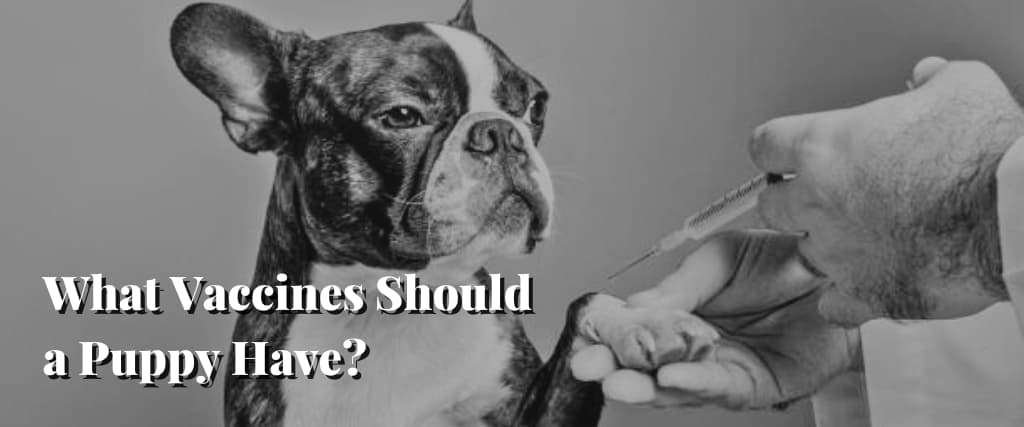
What Vaccines Should a Puppy Have?
Vaccinate your pups at 6-8 weeks of age, then again at 10-12 weeks, and finally at 16-18 weeks.
Your puppy or adult dog can now socialise with other dogs without worrying about contracting potentially fatal dog infections.
The immunisations help the dogs’ immune systems prepare to fight against these infections by producing antibodies. Vaccines are a much more cost-effective preventative measure than other forms of care your pet may require.
Consult a doctor about when and which vaccinations your dog should get.
After a week after your dog’s second round of immunisations, you can take it on walks or to the dog park.
Your veterinarian will take into account numerous criteria when deciding which vaccine schedule is best for your puppy:
- Age
- Lifestyle
- Vulnerabilities
- State-mandated vaccinations, as required by law.
Knowing the most prevalent illnesses that require vaccinations can be helpful.
1. Vaccines Against Distemper and Parainfluenza in Puppies and Dogs
You should give the Puppy DP vaccine to all dog companions between 6 and 8. Distemper and parvovirus are the deadliest diseases that may attack a dog, and this vaccine protects against both.
It’s crucial because by the time your puppy reaches six weeks old, the mother will have stopped nursing, and your puppy won’t be getting the antibodies (maternal antibodies) it used to get from the mother’s milk.
The DHPPiL shot follows Puppy DP by two weeks. Because puppies quickly lose their immunity to any given disease. Vaccine-induced antibodies are neutralised by those produced by the mother’s immune system.
Therefore, until your puppy is around 20 weeks old, you must continue giving them booster shots of the Distemper, Parvovirus, Hepatitis, Parainfluenza, and Leptospirosis (DHPPiL) vaccine at 2- to 4-week intervals.
After one year from receiving their last dose of DHPPiL, they need to receive a second dose of the vaccine (booster).
Parvovirus
Parvo can produce severe diarrhea and fever, which can cause fatal dehydration.
It’s incurable, much like a human virus. If your dog contracts parvo, you must give them plenty of water and make sure they’re comfortable as they fight off the disease.
Unvaccinated dogs, especially puppies, are especially vulnerable to parvovirus. This means immunisation is always a good idea.
Distemper
Distemper, like rabies, is an airborne or surface-transmitted fatal illness that can infect anyone a dog encounters, including sharing food and water bowls.
Many uncomfortable symptoms related to digestion and the nervous system result. And it usually ends in death. Immunisation is a best practice.
Dog Hepatitis
Your dog’s liver, kidneys, spleen, lungs, and eyes are vulnerable to this highly contagious virus.
The severity of symptoms might vary widely. And there is currently no treatment available for it. Because of this, vaccination is yet another pressing issue. Usually, a single vaccination will protect your dog from parvovirus, distemper, and hepatitis.
Leptospirosis
Some dogs exhibit no signs of contracting this bacteria after ingesting it from contaminated soil or water. Others may get milder cases of the flu.
Organ failure, death, and organ damage are all possible outcomes. This disease, like rabies, can transmit from pets to their human family members. It follows that all dogs should have this vaccination.
Dog Parainfluenza
- Adenovirus type-2
- Bordetella
- Dog Coronavirus (unrelated to COVID-19)
It might be puzzling that we still need to mention heartworm. This is due to the absence of a heartworm vaccine. Instead, you’ll need to check your dog’s heartworm status often. Throughout its life, your dog will need heartworm prevention medicine. Our vet will create a routine for your pet’s wellness exams and vaccinations, and we’ll remind you when it’s time to bring them in.
2. Your Dog Needs ARV Vaccine Protection From Rabies
Thousands of dogs contract rabies every year, despite the seemingly implausible nature of the disease. Rabies, unfortunately, is incurable.
Many reassure themselves that rabies is not a concern for our pets as long as a stray dog or other wild animal does not bite them. These days, bites are the most common way to contract rabies—it spreads when an infected animal’s saliva touches another animal’s blood. Therefore, virus transmission is highly likely if an infected animal licks a minor open wound.
Given that there is no known means to prevent rabies transmission following a bite from an infected animal, there is no reason to take such a substantial risk.
Only vaccination can guarantee protection against rabies.
When your pet is 90 days old, vaccinate it against rabies. A booster anti-rabies shot is necessary if they had their initial shot before they turned 45 days old.

Vaccinating Dogs and Puppies Against Dog Coronavirus
Contrary to popular belief, dog coronavirus infections are standard. Its prevalence in India is exaggerated. Canine coronavirus infections were formerly challenging to diagnose because no tests existed.
Dogs and only dogs are susceptible to dog coronavirus. Humans can’t catch this virus. It’s not SARS-COV2 or COVID-19.
Symptoms typically include stomach pain. The symptoms of dog coronavirus infection and dog parvovirus disease are very similar.
The disease can rapidly and quickly spread. Your dog can catch an infection via ingesting contaminated food, smelling contaminated waste, or licking contaminated surfaces. Your dog or puppy is at risk of contracting dog coronavirus whenever you take them for a stroll.
Vaccinating your dog against dog coronavirus at the appropriate time is the only way to guarantee that your pet will never contract the disease.
Vaccination of Dogs and Puppies Against Kennel Cough
Kennel cough is a common threat to dog health, especially among younger dogs. As the name implies, it is highly contagious among dogs in kennels.
It’s a prevalent bacterial illness in dog populations, especially in shelters.
Kennel’s cough manifests with a honking cough, a runny nose, fatigue, loss of appetite, sneezing, and a low-grade fever. Flat-faced (brachycephalic) breeds are especially susceptible to this condition, and while it is curable, it can cause significant respiratory distress.
The best action is to immunise your dog once against kennel cough. All dogs should have the annual Bordetella vaccine to prevent kennel cough.
Kennel Cough
Diseases that trigger an upper respiratory infection are collectively known as “kennel cough.” Multiple illnesses often work together to cause a persistent dry cough. The name stems from the ease with which the disease spreads among kenneled dogs.
Extreme discomfort, gastrointestinal distress, and even death are rare outcomes in dogs with this condition.
Common causes of kennel cough include the following viruses and bacteria:
Price of Extra Veterinary Care
Vaccines aren’t the only thing that can keep your dog healthy. After the first year, various additional services will benefit your puppy.
A puppy’s first or second vet visit should include a fecal exam to check for intestinal parasites like roundworms, hookworms, and flea and tick prophylaxis.
Approximately the first year’s worth of extra services will cost:
- You should expect to pay between $25 and $50 for a heartworm test.
- The cost of a fecal exam ranges from $20 to $40.
- Flea and tick treatments can cost $40-$200.
- Costs range from $25 to $ 120 for heartworm medication.
- (Many veterinarians still deworm because not all fecal examinations reveal parasites even when present; prices range from $25.0 to $130.)
The heartworm test and fecal exam will be standard procedures for all your dog’s veterinary visits. However, veterinarians can do more to help your dog stay healthy.
It’s also worth noting that some veterinarians prescribe annual screening tests in laboratories even before pets attain old age. These panels can cost anything from $100 to $400, with the higher end covering more in-depth tests done by senior lab techs.
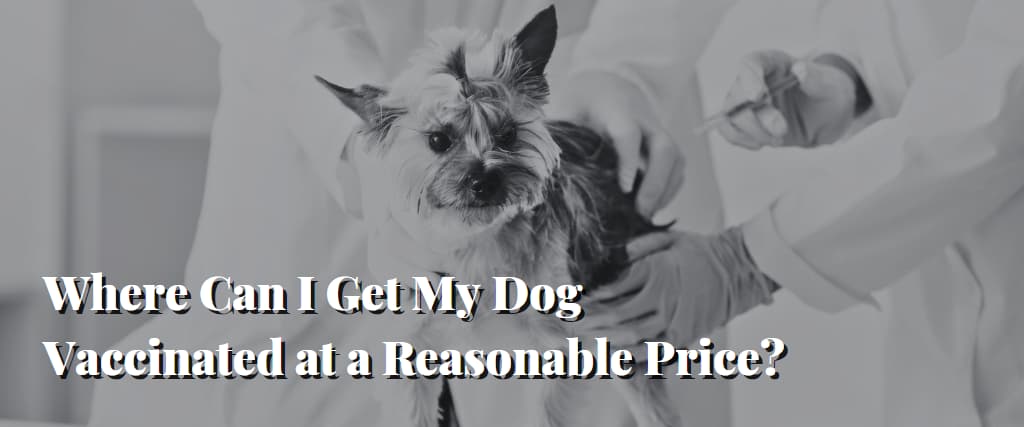
Where Can I Get My Dog Vaccinated at a Reasonable Price?
Most dogs are available for adoption from rescue groups, and shelters will already have undergone their initial vaccines. However, vets still advise bringing a new puppy in for an appointment within the first week.
You can check your dog’s health and prepare for upcoming vaccinations. In rare cases, groups may offer pet owners a certificate good for a free or discounted checkup at their preferred vet.
However, financial restraints make upkeep difficult. Contact municipal animal control and private charities in the area to determine if any short-term aid is available.
Several times a year, several veterinary organisations join forces to provide free immunisations and examinations to particular populations, such as people without housing and their dogs. In addition, local rescues and veterinarians frequently work together to offer free or low-cost services to the public.
The Best Pet Wellness Plans That Cover What Insurance Doesn’t
In addition to wellness payment options and “vaccines for life” programs, most veterinarians also occasionally conduct free or low-cost vaccination clinics at their clinics. The Humane Society of the United States also offers a long list of organisations that can help with the expense of vaccinating your dog.
You can cut costs by asking your veterinarian for immunisations with a longer shelf life (this varies with every vaccine). The cost per dose is higher, but there will be fewer overall. Regardless, we stress the importance of annual checkups.
When My Puppy Matures, Will He Still Need Vaccinations?
You could worry that you’ve set off on a path of costly medical upkeep. A puppy only needs a booster shot of their vaccines once every year or two after they’ve finished their initial round.
Even there, we may lend a hand. Come in when you need your immunisations and preventative care instead of paying for an entire clinic visit. As an adult dog, you can save time and money by purchasing one of our bundles.
Getting your dog vaccinated is a less daunting task now. Puppy health care is an early investment that will pay you in the long run. It will set the stage for a lifetime of good health. They’ll show their gratitude like a dog does: by loving you no matter what.

Does Pet Insurance Help?
Depending on the insurance, you’ll have to do some serious math crunching. While pet insurance is a good idea for unexpected medical expenses or surgery, it is likely to pay for preventative care like vaccinations if you pay a higher premium for a wellness plan. Keeping money aside for your pet’s medical care may be more manageable.
If you are adopting a dog, whether a puppy or an adult, you should talk to your vet about what immunisations your pet should have and when. The animal may need booster doses if you don’t know its vaccination history, and your vet may recommend this.
To protect your pet from tick-borne illnesses, see your veterinarian if you reside where ticks are common. They are a great resource for learning about diseases common in your state or region.
The American Veterinary Medical Association estimates that dog immunisations have prevented millions of animal deaths.
If you’re one of 36% of Americans with a dog, we hope you’ve seriously thought about vaccinations.
New research suggests that the protection against sickness and illness afforded by dog immunisations may extend even longer than previously believed by veterinarians and animal researchers previously believed.
This means that vaccinating your dog is a no-brainer.
Nonetheless, we’ve compiled this list of the top 5 advantages of dog vaccinations in case you still need more convincing.
1. It Prevents Serious Disease
The primary and most evident benefit of dog immunisations is disease avoidance.
You can lessen (or even eliminate) the likelihood of sickness in your pet by administering one of several vaccines.
It’s crucial to start the dog immunisation cycle at a young age. Your pet’s vulnerability to life-threatening illnesses increases with age. Since your dog’s immune system is still maturing, any assistance it can get in warding off illness is welcome.
Vaccination cycles are effective at boosting immunity to specific diseases over time. After receiving these immunisations, your pet’s immune system will better ward off any potential disease carriers.
Complete the vaccine cycle to protect your pet against these potentially fatal diseases.
Your puppy must return to the vet every three to four weeks for a course of vaccinations until it is about four months old.
Before getting a pet, ensure you have the time to vaccinate it.
2. You’ll Be Obeying The Law.
If caring about your dog isn’t enough to vaccinate him, the law does.
Dog immunisations are, indeed, mandated by law in every single state.
You should be aware that it is easy for any animal, including an indoor pet, to sneak outside or even inside your home.
Vaccinations (particularly the Bordatella vaccination, which helps protect dogs against kennel cough) are sometimes necessary if you want to board your dog on vacation or place it in “doggy daycare” while at work.
3. It Keeps Other Pets Safe
One of the best parts of having a dog is the pals and acquaintances you make at the dog park, pet-owner gatherings, and even out on the street.
Nonetheless, in sight of other animals, vaccinating your dog is the correct thing to do whether or not they are social butterfly.
Without vaccination, your dog poses a significant threat of spreading disease to other animals. Even more concerning is the fact that an unvaccinated animal poses a risk of spreading disease to people, even small children.
You should not have to live with that guilt.
Remember that most places need proof of vaccination for your dog just to enter a dog park.
If your dog enjoys socialising with other animals, you should inquire whether the local pet owners have vaccinated their animals.
It’s no secret that pet ownership can incur high costs, especially for a dog. Dogs have a lot of expenses, including food, kennel fees, playthings, grooming, and more.
However, when you factor in veterinarian care, those prices can quickly multiply by three or four.
A “pet emergency fund” for when something goes wrong with your dog is a must, but immunisations can also help you save money in the long run.
Vaccines aren’t always inexpensive, but believe us when we say that the expense of diagnosing and treating a major illness or disease—including medication, therapy, and veterinary bills—is far higher.
It’s not simply guilt you’ll feel if your dog becomes sick from an illness that a simple vaccination may have prevented. Your bank account will also suffer as a result of your poor choice.
Getting your dog vaccinated is an investment in its long-term health.
5. Vaccinating Your Dog Protects Both of You
We know you’ll do anything for your dog’s health, and we hope you’ve realised by now how necessary vaccinations are.
While caring for your pets is essential, protecting yourself and your loved ones from the germs and potentially dangerous diseases that pets can spread is important.
Even fatal infections like leptospirosis and rabies fall into this category.
Vaccinating your dog is the socially responsible thing to do, especially if they spend a lot of time with vulnerable populations like small children, older people, or individuals with compromised immune systems (as in the case of therapy dogs).
What More Vaccinations Should My Dog Get?
The following are examples of “non-core” vaccines that your veterinarian may recommend giving your dog:
- Bordetella: Bordetella bronchiseptica is a bacteria that causes inflammation of the upper respiratory tract in dogs. This inflammation causes coughing, called kennel cough, and other ailments in exposed dogs. Boarded dogs, doggie daycare regulars, and dogs who spend much time around other dogs are good candidates for this vaccine. These establishments typically demand proof of a Bordetella vaccination before admittance.
- Leptospirosis: This vaccination shields your dog from the potentially fatal Leptospira bacteria, which thrives in warm, wet conditions but is also frequent in urban areas due to the prevalence of rats as carriers. Leptospirosis is a common disease in warmer countries with considerable rainfall but can also occur in cooler climes. Puddles and other sources of still water contaminated with the urine of an infected animal pose a risk to dogs who drink from them.
- Lyme Disease: Deer ticks spread a bacterial infection that, if left untreated, can lead to kidney failure, cardiac issues, and neurological symptoms in dogs. Fortunately, vaccinating your dog against Lyme disease is the best way to protect him from this threat. You may help protect your dog from Lyme disease by giving him a tick preventative, monthly flea, and vaccinating him.
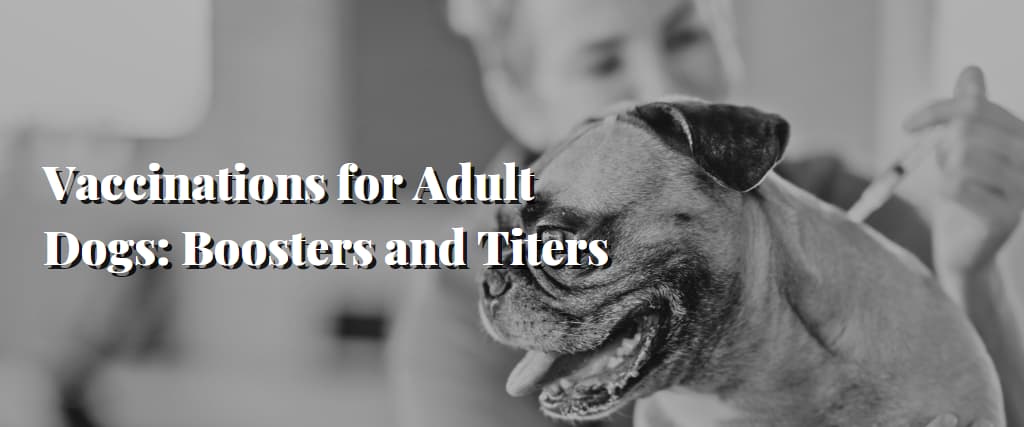
Vaccinations for Adult Dogs: Boosters and Titers
There is debate over whether annual vaccinations are necessary for adult dogs. Too many immunisations, according to some veterinarians, might be harmful to mature dogs. Others argue that yearly vaccines are required to protect against potentially fatal infections like distemper. Consult your veterinarian to determine the best immunisation schedule for you and your dog.
Titer tests are a popular alternative to annual vaccines for many dog owners. Titer testing can establish whether or not your dog needs additional vaccines by measuring its immunity to specific diseases. The rabies vaccine is the main exception to this rule because a titer test is impossible after vaccination. All 50 states have made this immunisation mandatory. Your veterinarian can provide you with a state-specific timeline.
Plus, it was all for naught. Your dog will shower you with unending affection as payment for all your hard work. You and your daughter are in for a wonderful and eventful first year. The beautiful connection between you two will flourish alongside her physical development.
| Age | Scheduled Vaccinations |
| 6 to 7 weeks | BordetellaDHPPi vaccine |
| 9 to 10 weeks | DHPPi vaccineLeptospirosisBordetella |
| 12 to 13 weeks | DHPPi vaccineCanine InfluenzaLeptospirosisLyme Disease |
| 15 to 17 weeks | DHPPi vaccineCanine InfluenzaRabiesLyme Disease |
Note that state laws vary widely on when and how often pets should receive a rabies vaccination and booster shot. The standard interval between booster shots of this vaccine is three years, but you should check with your vet to be sure.
Dog Vaccination Risks
Vaccinating your dog is no exception; there are always potential side effects. Vaccines can cause adverse effects, although they’re often minor and temporary. A tiny lump at the injection site is a common vaccine reaction that usually goes away after approximately two weeks. About one-tenth of dogs experience this condition.
Transient, self-resolving energy and a lack of appetite are rare adverse effects that may afflict 1 in 1,000 dogs. Vaccine-related immunological or allergic reactions are extremely uncommon, affecting only 1 in every 10,000 dogs.
Risk Assessment
Vaccines rarely cause serious adverse effects. While these stories often spark a public backlash against vaccines, some context is in order.
Vaccinations are a surefire way to keep your dog safe from deadly infections. Your dog’s life could be in danger if he contracts one of these fatal diseases because of a lack of vaccination. There is a negligible possibility that your dog will react severely to the immunisations.
It’s also helpful to know that antihistamines can help with mild allergy responses if you have them checked out quickly. Because of the potential for adverse reactions, your veterinarian may request that you remain in the clinic for a set period after receiving a vaccine.
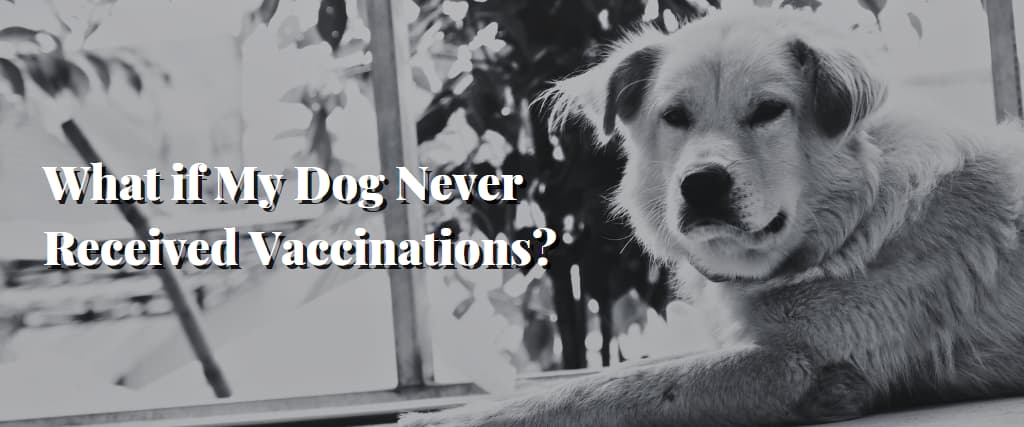
What if My Dog Never Received Vaccinations?
Recently, someone asked me an important question. “I’ve never vaccinated my dog. The individual asked, “Do you think I’m taking a significant risk?” He had financial difficulties, and dog vaccination wasn’t a priority.
Some pet owners may hesitate to vaccinate their animals because they worry about potential adverse reactions.
Vaccination Risks for Puppies
People are understandably anxious about vaccinating newly acquired dogs. It only makes sense that we want to research vaccine-free options for our puppies.
Since some risks are associated with vaccines, injecting a potentially harmful drug into a healthy puppy may seem counterintuitive.
There will be those among us who wonder if there aren’t more natural, less invasive options we could explore.
Methods of Enhancing a Puppy’s Natural Immunity and Alternative Medicinal Therapies
Compulsory Puppy Shots
Some of you must vaccinate your puppies. It’s conditional on your location.
However, many of us must choose to vaccinate our pets, which can be challenging.
Allow Your Dogs to Develop Immunity Naturally.
It’s comforting to think that a healthy puppy will eventually build immunity when left alone and provided with a balanced diet.
However, there is more to immunity than meets the eye.
A closer examination of the natural immunity process is required to grasp its operation.
How Does Immunity to Disease Work?
Dogs acquire immunity to previously encountered diseases in the same way that mammalian species do.
When a microorganism like a virus or bacteria gets into your dog’s system, generally through his mouth or nose, it multiplies and causes illness.
Your dog’s immune system produces antibodies to fight off sickness once it detects the presence of a foreign invader.
A dog can build antibodies strong enough to overcome a sickness without showing any outward signs of illness. The presence of antibodies in the blood of seemingly healthy dogs has allowed scientists to draw this conclusion.
However, with more severe infections, most dogs will become ill; some, such as puppies, may become extremely ill or even die.
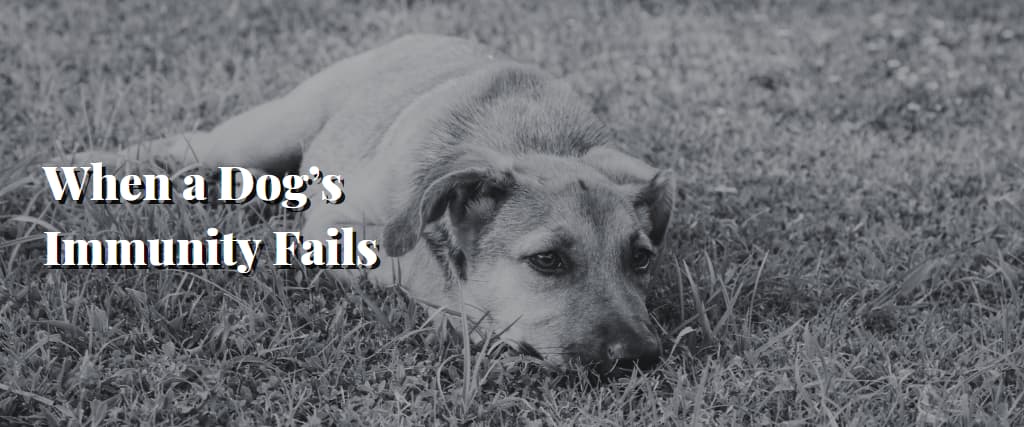
When a Dog’s Immunity Fails
Is a raw food diet appropriate for your dog?
That’s because making antibodies can be time-consuming and last several days.
If it’s a mild infection, the dog’s immune system can produce enough antibodies to wipe out the invaders before they do too much damage.
Diseases like kennel cough exist. Before the disease can do much damage, most healthy dogs will have produced enough antibodies to fight it off successfully.
This system may fail in more severe disorders or in animals with weakened health.
How Do Dog Vaccines Work?
If a puppy’s immune system cannot produce enough antibodies in time, the sickness will eventually kill him.
Vaccines protect puppies by introducing them to innocuous components of the disease, which the puppy’s immune system then rejects.
The puppy’s immune system quickly activates, producing antibodies to combat the threat.
Boosting Your Dog’s Natural Immunity
Counting on a dog’s innate resistance is risky. When fighting off deadly diseases like distemper and rabies, most dogs’ immune systems just can’t cut it.
Veterinary doctors use a stethoscope to examine dogs in the clinic. Unfortunately, as of this writing, we do not know of any other means to stimulate the production of the immune system’s antibodies to combat disease.
By enhancing the dog’s general well-being, we can raise the likelihood that the immune system will be in peak working order and produce antibodies quickly and efficiently.
The problem is that even the most advanced immune system will take time to develop antibodies against a pathogen it has never encountered. And nearly all of the unvaccinated pets will succumb to the deadliest diseases.
It takes time to recognise problems and fix them. That’s why we need a foolproof method of preventing the spread of deadly infections among our puppies.
What About Natural Treatments Like Herbs and Homeopathy?
Many people seek an alternative to immunisations because they are not entirely risk-free. They choose natural remedies such as herbs and homeopathy over conventional pharmaceuticals. But will these save our dogs’ lives from deadly diseases?
The focus of holistic medicine is on the individual as a whole.
They consider the patient’s circumstances, including their health and environment.
It implies taking into account the whole person, not just their symptoms.
This can only have positive effects.
Holistic veterinarians exist, but all conventionally trained medical professionals take a holistic approach to patient care.
It is unacceptable for a doctor to treat symptoms without investigating the underlying causes.
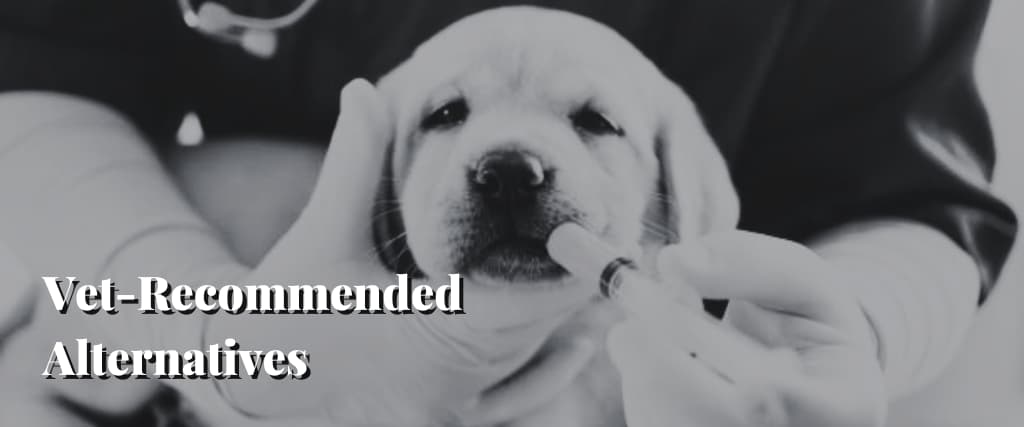
Vet-Recommended Alternatives
People often go to a holistic veterinarian as an alternative to conventional medicine.
Indeed, many people do.
Herbal supplements and acupuncture are examples of such alternatives. Unfortunately, neither acupuncture nor herbal medicine can replace the need for vaccination.
Some veterinarians still use homeopathic treatments, but they are in the minority.
If you’re looking for a completely risk-free treatment for your pet, you may feel tempted to pursue the route of a homeopath who offers alternatives to vaccination. Let’s take a closer look at that.
Vaccinating Puppies With Homeopathic Remedies
Samuel Hahnemann developed homeopathy in the 18th century.
It was just as credible as competing medical philosophies three centuries earlier.
The mystery lies more in its survival and subsequent resurgence in modern times.
How Does Homeopathy Work?
The theory behind homeopathy is that treating a symptom with a similar one will produce the desired result. In other words, the treatment consists of a small drug dose that, when introduced into the body, causes the same symptoms as the disease.
To stimulate the body’s defences against the symptoms, a homeopathic cure for your dog’s vomiting, for instance, can include an ingredient that causes vomiting.
Of course, in principle, this may result in even more vomiting than before! However, homeopathic treatments don’t have any drawbacks, which sounds fantastic.
Unfortunately, homeopathy doesn’t create any unwanted effects because it doesn’t do anything.
This is due to the dilution technique that Hahnemann developed. He watered down the original dose of his medicine. Not once, but numerous times.
Dilution and Medicinal Power
Homeopathy is based on the idea that a substance’s potency increases with dilution.
This could have been plausible back in the 18th century. However, modern science has shown that weaker substances result from diluting stronger ones; therefore, we know that higher doses of medications produce stronger effects.
In addition, homeopathic medicine dilutes to the point where they no longer resemble the original plant or commodity they came from.
All that’s in them is water or sugar.
This is why there are no negative effects. That’s also why their efforts achieve zero results.
No Effects
Homeopathy is useless. There are no negative reactions because it does nothing.
Both individual scientists and international teams of specialists have repeatedly and decisively debunked this theory.
The UK’s House of Commons Science and Technology Committee in 2010 and the Australian government in recent years have shown support.
What Are the Dangers of Not Vaccinating My Dog?
If you can choose to or not to vaccinate your dog, but there are no alternatives, what will happen if you don’t?
Numerous laboratory trials have demonstrated the efficacy of vaccinations in protecting dogs exposed knowingly and purposefully to illness. Exposure to these pathogens increases a dog’s likelihood of contracting a disease.
The community-wide exposure danger is something we need more information on. However, we do have some information that may shed light on the situation.
For instance, in 2002, a Polish study compared the prevalence of distemper between vaccinated and unvaccinated dogs in Warsaw.
They found that, whereas 22% of affected dogs had previously had vaccinations, 66% had never received any.
In 2005, researchers in Connecticut found that 63 per cent of unvaccinated dogs contracted Lyme disease, but only 25 per cent of vaccinated dogs did.
Between 1971 and 1973, 629 cases of dog rabies were documented in the United States, 90% of which were in dogs without vaccination. There were 21 instances of vaccine failure, but overall, vaccinated dogs were much less likely to exhibit aggressive behaviour than their unvaccinated counterparts. So the effect was still positive.
Rabies vaccinations are a requirement in many parts of the world due to the apparent dangers the disease poses to humans.
Herd Immunity
We all know that vaccines have flaws, but even if they aren’t 100% effective, they can drastically reduce the prevalence of a disease in a population.
To achieve this level, immunise a sizable percentage of the community’s dogs to achieve this level.
If herd immunity fails and an epidemic occurs, that is when we will find out. Such as the Parvovirus outbreak that hit London, UK, in June 2017 or the Southern United States in 2016.
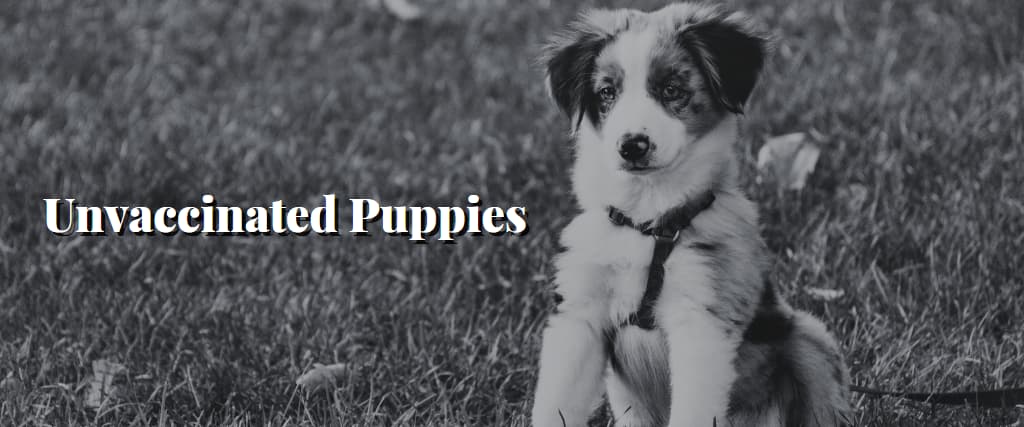
Unvaccinated Puppies
It’s true that not everyone gets their puppy vaccinated. This is a challenging course of action, but ultimately, it is the owner’s decision.
Vaccinating puppies is the best way to prevent them from getting sick. We can’t give you a definitive answer because dangers change annually and from place to place.
Furthermore, not all dog subjects exposed to a pathogen may develop symptoms.
Some people will get immune to the virus and never show any outward symptoms.
The administration of homeopathic medicines to a puppy is entirely
safe, and the puppy will suffer no harmful effects from ingesting them. However, remember that he, too, will have no
immunity to disease.
Leaving him unvaccinated will have the same effect. Puppies given homeopathic treatment for parvovirus infection died in a well-known experiment.
Puppies may make it without immunisation if they are lucky. There is no denying that some unvaccinated dogs make it through and even thrive. Unfortunately, we can’t guarantee that your dog will be one of them.
The answer is conditional on the prevalence of illness in your area.
Re-Vaccinating Older Dogs
Many dog owners, especially those with older dogs that have already received their puppy immunisations, are inclined to extend the time between booster doses beyond the guidelines to save money or reduce risk.
Once upon a time, it was usual for veterinarians to give all dogs the maximum dose of each vaccine annually. This is less prevalent these days, and most veterinarians do adhere to the recommendations of the World Small Animal Veterinary Association regarding vaccine frequency.
You can test for antibodies to see if your dog is still protected. You’ll need to draw blood from your dog to do this.
Sending it off to a lab will let you know if his immunity to the diseases against which you are thinking about vaccination has waned.
If this matter draws your attention, discuss it with your vet.
Vaccine Safety
It’s essential to provide people with all the necessary information to make an informed decision rather than sugarcoat anything.
Despite some potential side effects, today’s puppy immunisations are extremely safe.
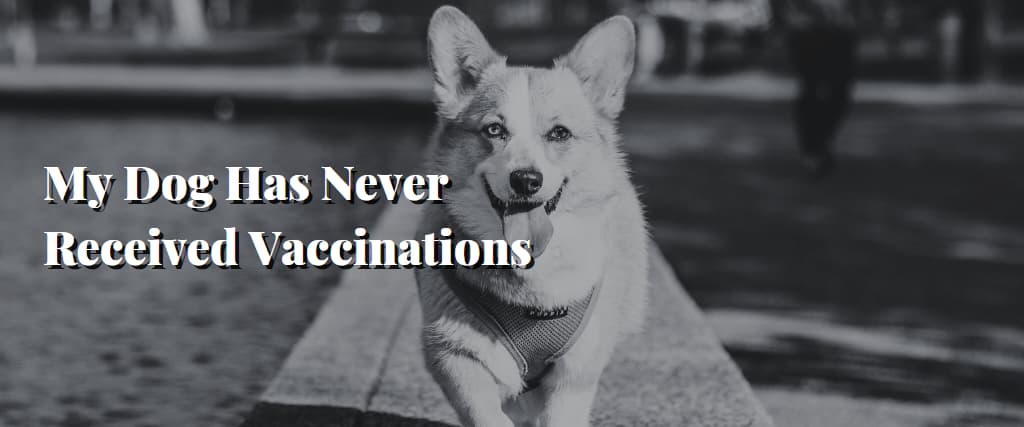
My Dog Has Never Received Vaccinations
Despite all the advances in medicine over the past century. We still need treatment for everything. It’s only human to try to find a way out of a bad situation. Vaccines are costly, so it’s easy to see why people might want to avoid them.
There is little doubt that the human body responds to specific alternative treatments, and many modern pharmaceuticals rely on traditional herbal cures. However, there is currently no viable alternative to vaccination.
It is your choice to vaccinate your puppy if it is not required by law where you live.
Vaccination, like many good medical therapies, might have unwanted side effects. However, for most dogs, these consequences are negligible at best. In particular, when weighed against the benefits in terms of safety from some extremely fatal diseases.
While the expense of an annual vaccination is significant, the cost of treating a sick dog is far higher.
Vaccinating your puppy helps to maintain herd immunity, which protects dogs throughout the community. As a result, your dog and the community’s dogs will benefit.
Conclusion
Vaccinating a dog once a year can cost anywhere from $80 to $240, depending on where you live and which veterinarian you choose—the first year’s price averages out to $120. There are pet insurance providers that will pay for these vaccinations.
After the first year, the expense of puppy immunisations rises to $100 or more, not including potential extras like deworming and flea and tick control.
Don’t try to save costs when preventing these diseases; it often costs less overall.